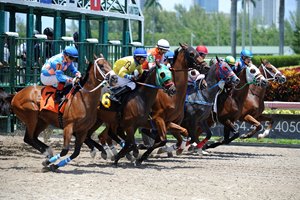Gulfstream Riders Receive Concussion Baseline Testing


A highly regarded sports medicine program in place at Maryland Jockey Club tracks may serve as an example of what can be accomplished at other North American tracks in terms of rider safety, especially relative to concussions.
Dr. Michael Swartzon, who has worked with the NFL's Miami Dolphins, conducted concussion baseline testing on 26 riders Dec. 28 at Gulfstream Park. Testing of such things as reflexes, memory, and balance of healthy riders provides medical personnel a baseline when evaluating a rider for a potential concussion.
Swartzon, of the Baptist Health South Florida's Miami Orthopedics and Sports Medicine Institute, credited The Stronach Group, Gulfstream Park, and the Jockeys' Guild with moving forward on the new protocol that will see Swartzon or an athletic trainer in place for big race days at the Championship Meet. On other race days, Swartzon plans to evaluate riders for concussions at his office on the day of a spill or, at the latest, the next day.
In recent years Swartzon has discussed the Miami Dolphins' concussion protocol with Dr. Kelly Ryan, who three years ago helped put a concussion protocol in place at Maryland Jockey Club tracks for jockeys and exercise riders—MedStar Horsemen's Health, a partnership between the Maryland Thoroughbred Horsemen's Association and The Stronach Group's Maryland Jockey Club.
"I think it's really a great step, not just for the jockeys' well being, but the whole industry—racetracks—it's protecting owners and trainers, horses," said Jockeys' Guild national manager Terry Meyocks, who noted that a rider who was not at their best could endanger other riders and horses. "It's important not just to have the baseline testing but they're bringing in athletic trainers on the big days."
Meyocks credited The Stronach Group with stepping up to the plate in Maryland (he also credited horsemen there) and now Gulfstream.
Swartzon also works with two small-college athletic programs in South Florida and has worked with the NHL's Florida Panthers. He said it's hard to believe that concussion protocols are not in place at racetracks throughout the country because competing is tied to jockeys' livelihood. He said potentially injured riders should have guidance.
"At the college and professional level, you have to have protocols in place because winning is, unfortunately, why everyone is out there and can really push athletes to return to play or ride before they're ready," Swartzon said. "There's financial incentives involved, and when there's financial incentives involved it's very easy to be biased and not concentrate on the health and well-being of the rider."
In conducting the baseline tests Friday, Swartzon's group introduced themselves, educated riders about concussions, encouraged them to look out for other riders, and explained concussion symptoms and potential concerns. Swartzon said The Stronach Group, Gulfstream and the riders were very accommodating Friday as he tested most of the South Florida tracks' jockey colony.
"We explained that the track was asking us to come on board to give them the same level of care that other top professional athletes in the U.S. and around the world get," Swartzon said. "They would get the same treatment and wouldn't be neglected."
Swartzon said plans for this year are an excellent start to the program, which has the potential to grow to the point where an athletic trainer could be in attendance every race day. He noted that while ambulance crews can stabilize injured riders and send them to the emergency room, which is needed for life-threatening and serious injuries, trainers can provide athlete-specific care and recommend specialists for jockeys who suffer less serious injuries.
